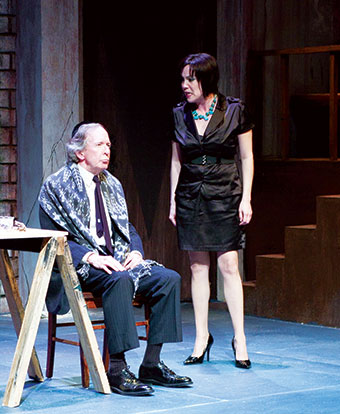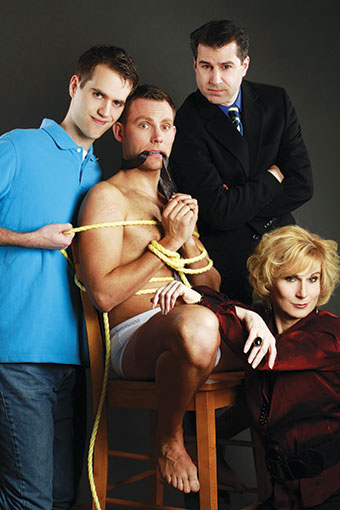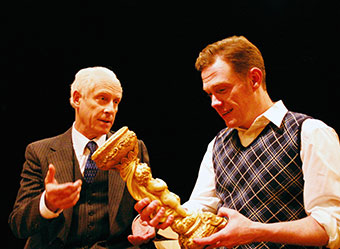Five Great Plays
by Anthony Chase
This is an extraordinary week for theater in Buffalo. Last week’s opening of Stephen Adly Guirgis’ The Last Days of Judas Iscariot at Road Less Traveled Theater is being joined by the openings of similarly thrilling scripts at four other theaters. The range of plays speaks to the diversity of the theater scene here and to the robust health of the producing theaters. The shows are:
• a philosophical drama by a cutting edge American writer;
• an Irish psychological thriller;
• an elegant comic fantasy by Buffalo’s most celebrated playwright;
• a comedy-drama about African American women;
• an irreverently cynical comedy about gay America, set at the height of the AIDS crisis.
All this, and Wicked too! The most popular musical of the day has settled in at Shea’s for a prolonged visit through May 22.
It seems that the opportunity to choose from a great variety of theater offerings is the right of every Buffalonian—as much as the right to order suicidally hot chicken wings, to take visiting relations on the Maid of the Mist, to root for the underdog, to enjoy Canadian beer on tap, to see masterworks of Modern Art on a Saturday afternoon, to use “yous” as the plural of you, and to have a waitress call you “honey.”
Buffalo is a theater-going town.
There are those who argue that we have reached a tipping point, and that when a new theater opens, it pulls audience away from existing theaters. Data suggests, however, that this is simply not true. There is, in fact, very little overlap between theater audiences. In other words, people who are flocking to see Wicked in the thousands are not the same people curious to engage in the playful intellectual high jinks of Stephen Adly Guirgis’ The Last Days of Judas Iscariot; and audiences who are seeking the pleasures of Jar the Floor at the African American Cultural Center’s Paul Robeson Theatre are not the same people who will be flocking to see The Grand Manner, Pete Gurney’s tale of meeting the great Katharine Cornell backstage at Broadway’s Martin Beck Theatre in 1948.
We’ve got more than 20 theaters, all drawing audiences and finding their own niche. Shea’s has miraculously topped 12,000 subscribers and can now boast that it is home to the most lucrative single-week engagement on the national touring circuit. But this vitality is not exclusive to musicals. Shakespeare in Delaware Park continues to hold its own with about 40,000 attendees each summer. At the time it folded, even venerable Studio Arena Theatre had maintained its strong subscription base—attendance was never at the root of its financial problems.
We’ve got Jewish theater; African-American theater; Irish theater; Spanish theater; children’s theater; gay and lesbian theater; avant-garde theater; pro-labor/activist theater; Shakespearean theater; classical theater; theater specializing in new work, musical work, and short work; American classical theater; and American contemporary theater. One could argue that the audience has far from peaked, and that it won’t until every potential audience in Buffalo can finds its life reflected at a Buffalo theater—in other words, until there is something for everyone.
I find it encouraging, when I go to ALT or to American Repertory Theatre, to see audiences that are notably young—and I mean millennially young. The future may also bring theater geared to our Somali and Burmese immigrants—and if it exists already, please let me know.
Moreover, these theaters are, despite funding concerns, operating at a level appropriate to their financial means and are generally functioning in the black. The plea for public funding is not a desperate and immediate cry for survival; rather, it is an appeal to help Buffalo’s theaters bump up to the next level in terms of production, administration, and national profile. We all benefit from such cultural vitality. (To give them a little boost, you can make a contribution to your favorite theater, or visit www.giveforgreatness.org.)
A roster of the five new productions up this week is as follows:

The Last Days of Judas Iscariot
Scott Behrend of Road Less Traveled Theater continues his quest to forge connections to the big hitters of the New York stage by bringing in playwright Stephen Adly Guirgis to see his own play, The Last Days of Judas Iscariot, as this year’s “American Masters” offering. (Last year’s guest was Edward Albee.) Mr. Guirgis will attend the theater’s May 14 gala.
The play imagines a re-trial for Judas Iscariot in order to examine his betrayal of Jesus in exchange for money, his futile effort to recant, and his subsequent suicide. The dilemma? If God is all-forgiving, why should Judas be condemned to hell? To make the case on each side, witnesses are called, running the gamut from Mother Theresa to Sigmund Freud.
The choice of this play was certainly motivated, in part, by the presence of two Buffalonians in the original off-Broadway cast: Jeffrey DeMunn, who played the Judge/Caiaphas the Elder/and St. Matthew, and most certainly Stephen McKinley Henderson, who gave a tour de force performance as Pontius Pilate.
When I saw the play off-Broadway, I was impressed with the ingeniousness and playfulness of the playwright’s cerebral gymnastics. At the same time, the script seemed unduly long, as multiple characters took us through repetitive terrain. Nonetheless, it was clearly the work of a brilliant playwright, recognizable from his marvelously compelling and thought-provoking Jesus Hopped the A Train, which had played so brilliantly at the New Phoenix Theatre in Buffalo.
The Road Less Traveled production initially promised Buffalo the chance to see Stephen McKinley Henderson reprise his New York performance. When Henderson later had to withdraw from the production, Road Less Traveled happily remained committed to the project, and they have done so with vigor and enthusiasm. The result is a lively rendering of the play, that revels in Guirgis’ vivid and often mirthful characterizations of familiar biblical characters.
Jim Maloy is especially engaging as the judge and Caiaphas the Elder, two charmingly humorous characters. Victoria Perez scores comical home runs as an angel and as Mother Theresa. Kristen Tripp-Kelley is perfection as a wide-eyed woman on life support, as a teaching nun, and as Mary Magdalene. Adrienne Lewis is riotously funny as foul-mouthed and unrelenting Saint Monica, who urges audience members to pray to her because, with nagging motherly tenaciousness, she gets results!
Ever precise in her choices and clear in her presentation, Lisa Vitrano gives a tour de force performance as the defense attorney whose profound sense of ethics, coupled with her spiritual doubts, compels her to seek a second hearing for Judas. Verneice Turner gives moving performance as Judas’ grief-stricken mother. Matt Witten makes a strong showing as Judas, a conflicted man who spends much of the evening in a catatonic state. Jay Pichardo lends charisma and intensity to the role of Jesus. Witten and Pichardo’s scene together is powerful and provocative.
David Hayes, an excellent actor, is marvelously convincing at every moment, and is especially gripping in his final monologue as a man telling the story of his own betrayal of the woman he loved. The speech brings unity and clarity to Guirgis’ artfully argued thesis of a play.
The Last Days of Judas Iscariot continues at the Road Less Traveled Theatre, Market Arcade Film & Arts Centre, 639 Main Street, through May 22. Tickets are available through Ticketmaster: 745-3000.

Fit to be Tied
Nicky Silver is a favorite at Buffalo United Artists. Known for such dark farces as Pterodactyls and The Food Chain, this is a playwright who tackles subjects like guilt, greed, loneliness, hatred, resentment, disappointment, self-destructiveness, and envy and finds…what else? Comedy!
It is 1996. As the play begins, independently wealthy Arloc confides in the audience that his former lover has just died from complications of AIDS and that his own diagnosis rests in an unopened envelop. Yes, I said comedy.
Arloc’s spectacular wealth is derived from a boyhood inheritance that inspired his mother, Nessa, excluded from her estranged husband’s will because of her promiscuity, to sue her own child. The mother vs. son litigation brought Arloc and Nessa a unique brand of Manhattan celebrity and a permanently strained relationship. It is the end of the holiday season and Nessa has come to Arloc in order to ask him for money.
The play is largely propelled forward by the flamboyant personality of Nessa, played at BUA by Lisa Ludwig, again tackling a role she first played at BUA several years ago to considerable acclaim. Prone to excesses of every sort, Nessa, like every character in the play, has a difficult time embracing anything that might actually be good for her. When the events of the plot bring her to realize the degree to which she has failed her son, she takes a well-intentioned but ill-advised action: She bribes the man her son loves into pretending that he loves him in return. She does this with uncommon style and symbolic imagery worthy of a fairytale. For every day the young man stays and pretends to love Arloc, she will give him a single pearl from an astonishingly valuable necklace. These pearls are perfectly matched in color and size. Together are worth tens of thousands of dollars, many times what the pearls would be worth separated.
And herein lies a tale!
When the play first opened in New York, starring Jean Smart of Designing Women fame (whose every gesture and intonation I recall with vivid joy), it was seen as a blisteringly funny social critique and a welcome antidote to more serious theater fare of the time, like Six Degrees of Separation (which also dealt with the foibles of Manhattan’s moneyed elite) and Angels in America (which also tackled huge issues like AIDS…and angels). The play also harks back to an earlier generation of gay comedies, including echoes of Noël Coward’s Design for Living.
In addition to Miss Ludwig, who plays stylish, childish, witty, and generally self-absorbed Nessa, the cast features Kurt Erb as Arloc, Michael Seitz as the Radio City Music Hall angel he loves, and Darryl Hart as Nessa’s intolerable but peculiarly devoted second husband.
Fit to be Tied plays through May 21 at the BUA Theater, 119 W. Chippewa Street. Call 886-9239 for details.

Shining City
Irish playwright Conor McPherson, author of The Weir and The Seafarer, is a marvelous storyteller. This week, the Irish Classical Theatre Company presents his Tony-nominated play, Shining City, directed by visiting director, Gordon McCall.
This is a ghost story. John, played by Vincent O’Neill, tells his therapist, Ian, played by Chris Kelly, that he has been seeing the ghost of his dead wife in the home they shared. The woman died in a terrible automobile accident, and John is so distressed by her disturbing appearances, always looking as if she wants to speak, that he has moved out of the house. John reveals to Ian that there were serious problems in his marriage.
For his part, Ian is a former priest, newly embarking on a career as a therapist. In fact, John is his very first patient. Ian has left the priesthood to be with his fiancée, Neasa, played by Kelly Meg Brennan, with whom he has a baby. All is not well in this troubled relationship, either, however. Ian has been sleeping in his office and Neasa begs him to go home before revealing the depths of her own dissatisfaction.
Michael Renna plays Laurence, the penultimate visitor to Ian’s office.
McPherson specializes in the lives of damaged people. In this play we see fragments of these lives spoken between silences evocative of Harold Pinter. The play originally opened at London’s Royal Court but enjoyed a celebrated Broadway production, directed by Robert Falls and starring Brian F. O’Byrne as Ian, Oliver Platt as John, and Martha Plimpton as Neasa. The play is a model of theatrical economy with beautifully rendered characters and situations guaranteed to linger in the memory—like a haunting.
Shining City is performed at the Andrews Theatre, 625 Main Street. Call 853-ICTC for ticket information.
The Grand Manner
In The Grand Manner, playwright A. R. Gurney, author of Sylvia, The Cocktail Hour, and The Dining Room, recalls an incident in 1948, when, as a teenager, he traveled from the New England prep school where he was a student to see the great Katharine Cornell, “First Lady of the American Stage,” in William Shakespeare’s Antony and Cleopatra. Both Gurney and Cornell had grown up in Buffalo, where their families still lived at the time.
As the story goes, Gurney’s grandmother had arranged for him to visit the great star backstage, which he did. The two of them talked about Buffalo. She signed his program. He left.
In the years that followed, Gurney often considered that the event could be expanded into a play. And so it has been.
The Grand Manner played at Lincoln Center in New York this past summer with Kate Burton as Cornell, Boyd Gaines as her husband Guthrie McClintic, and Bobby Steggert as young Pete Gurney. Jumping at the availability of a script with so many Buffalo references and such a distinguished Buffalo pedigree, the Kavinoky Theatre leapt on the script, becoming the first theater in America to contract for a production after New York.
In the play, Gurney tells the story of his backstage visit twice. In the first telling, he recounts events as they actually happened. But in his second version, he engages in the fantasy of his teenaged self, stage struck and yearning for a career in the theater. In his fantasy, he accepts Cornell’s invitation to stay for a glass of Coca Cola and gains an intimate glimpse into her world and a preview of his own midlife insecurities, projected onto the legendary actress.
Directed by Robert Waterhouse, the Kavinoky production stars Barbara Link LaRue as Katharine Cornell, Richard Lambert as Guthrie McClintic, Eileen Dugan as Cornell’s friend and manager Gertrude Macy, and Andy Herr as Pete Gurney.
The Grand Manner is a masterful bit of Gurney-esque theatricality. In the fantasy retelling of the 1948 anecdote, the playwright weaves the facts of Cornell’s life and career into some deliberate fabrications in order to tell of tale of a Golden Age of Broadway that was, in the Gurney lexicon, synonymous with a Golden Age for the City of Buffalo. Here, we find Cornell in her maturity confiding in and looking for reaffirmation from the playwright’s teenage self.
Ultimately, it is a sentimental yet life affirming work, ideally suited to the Kavinoky Theatre. The Grand Manner will play through May 29 at the Kavinoky, 320 Porter Avenue. Call 829-7668 for details.
Jar the Floor
With Jar the Floor, playwright Cheryl L. West explores the expansion of possibilities for African American women in the 20th century by bringing together four generations of one family for the 90th birthday of the matriarch. Directed by Paulette Harris, the Paul Robeson Theatre production will feature Betty Stone, Debbi Davis, Daigi-Ann Thompson, Kaitlynd Brzostowicz, and June L. Saunders Duell.
The play is brimming with witty sharp-tongued dialogue and is overstuffed with women’s issues that are furled out like a checklist. The formulaic aspects of the script are overtaken by the appeal of the characters, making Jar the Floor a favorite in the American repertoire.
Performances continue through April 29 at the Paul Robeson Theatre in the African American Cultural Center, 350 Masten Avenue. Call 884-2013 for information.
|
Issue Navigation> Issue Index > v10n17 (Best of Buffalo Issue, week of Thursday, April 28) > Five Great Plays This Week's Issue • Artvoice Daily • Artvoice TV • Events Calendar • Classifieds |









 Current Issue
Current Issue